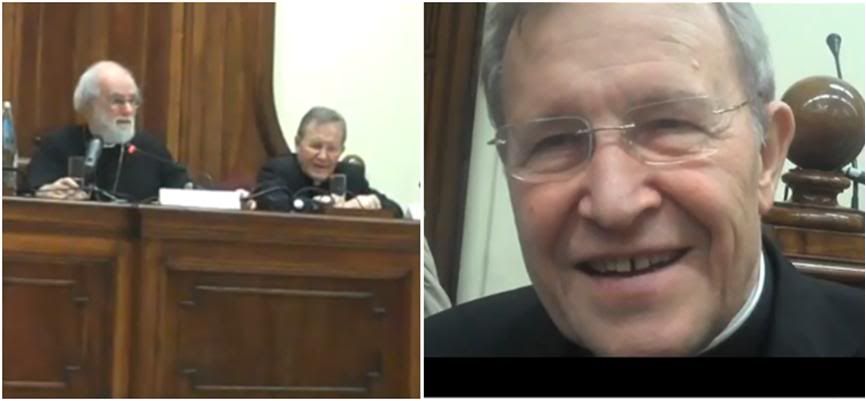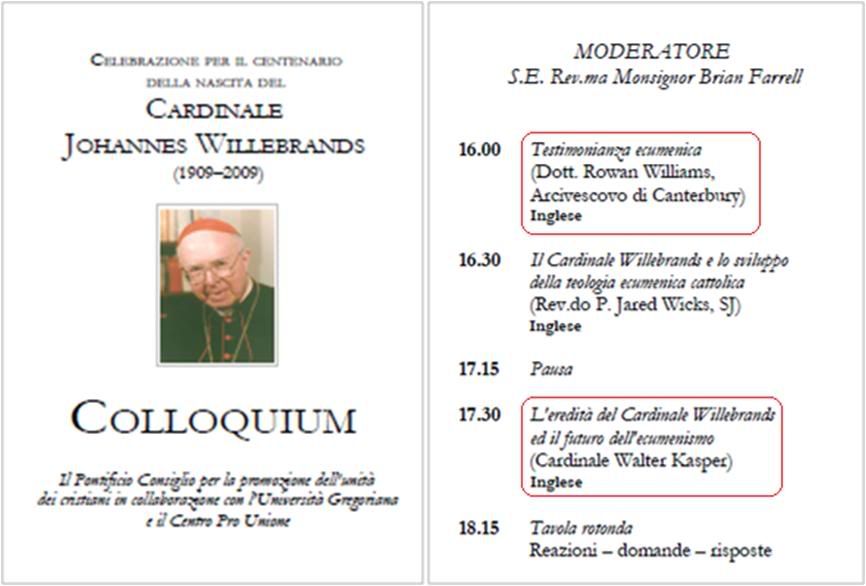 The future of ecumenism
The future of ecumenism
by
Cardinal Walter Kasper
President, Pontifical Council
for Promoting Christian Unity
Translated from
the 11/20/09 issue of

 Cardinal Kasper with the Archbishop of Canterbury at the Colloquium.
This is the lecture delivered by Cardinal Kasper at the Colloquium sponsored by his dicastery to mark the 100th birth anniversary of Dutch Cardinal Johannes Willebrands, the first President of the Council whom he succeeded. Cardinal Willebrands died in 2006 at 96.
Cardinal Kasper with the Archbishop of Canterbury at the Colloquium.
This is the lecture delivered by Cardinal Kasper at the Colloquium sponsored by his dicastery to mark the 100th birth anniversary of Dutch Cardinal Johannes Willebrands, the first President of the Council whom he succeeded. Cardinal Willebrands died in 2006 at 96.

Cardinal Johannes Willebrands was one of the most important figures in the history of the Catholic Church in the preceding century.
He was one of those giants who carried us on their shoulders when it comes to ecumenism, as well as religious relationship with the Jews.
On the occasion of the centenary of his birth, we remember him with profound gratitude as a loving man and eminent theologian.
Willebrands succeeded in creating a network that proved very useful when, in 1960, John XXIII instituted the Secretariat for Christian Unity. Indeed the Pope could read the signs of the times, and indeed, could see the signs of the Holy Spirit at that time.
It was he who decided that the theme of the Council he announced on January 25, 1959, should be the unity of all Christians. It was he who, following the suggestion in 1960 of the Archbishop of Paderborn, Lorenz Jäger, set up the Secretariat for Christian Unity, thus offering an institutional channel for the ecumenical movement in the Catholic Church, at the level of the universal Church.
As its first secretary, Willebrands contributed to shape the new organism, which was initially presided over by Cardinal Augustin Bea, and then by Willebrands himself, from 1969 until he retired in 1989.
He had the gift of finding and inspiring the right co-workers. To cite a few, I will mention here Jérôme Hamer, Charles Moeller, and Pierre Duprey, who all worked for the Secretariat (which later became the Pontifical Council for Promoting Christian Unity), from 1963-1999.
His collaborators in a wider sense were Yves Congar, Gustave Thils, Balthasar Fisher, Karl Rahner, Johannes Feier, Jean Corbon, Emmanuel Lanne, Raymond Brown and others. Among the women, one must mention Corinna de Martini and Josette Kersters.
We are profoundly grateful to all the men and women who were there in the early years of the Council.
But
the grand enthusiastic common vision of the past is absent today: this is a deficiency which also afflicts the World Council of Churches.
[Excuse me, Cardinal Kasper. You are writing this in the Pope's newspaper - the Pope who, in his first homily a Pope, singled out the cause of Christian unity as the priority task he set for himself! How much more enthusiasm and what greater vision can there be? More to the point, who has had more ecumenical success in such a few years?] Public opinion has started to speak of stagnation in ecumenism and of an ecumenical winter.
Cardinal Willebrands was farsighted enough to predict that a certain disenchantment would set in after the initial enthusiasm. He warned against thinking that Christian reunification could be achieved in a few years, and that such expectations would only lead inevitably to disappointment.
In this difficult situation, the Catholic Church cannot simply sit around and wait. She has a special responsibility. Her one ecumenical responsibility derives paradoxically from the Petrine ministry, which is often seen as the principal obstacle to unity, but which is a ministry of unity.
In particular, it is precisely in this situation that the Church of Rome should take on herself the responsibility of being the 'seat that presides in charity', in the words of Ignatius of Antioch.
Let us concentrate therefore on the following questions:
- What is our vision for the future of ecumenism?
- What is our task at the start of this new century and new millennium?
- How can we exploit to the maximum the legacy of Vatican-II and of Cardinal Willebrands?
Ecumenism is not just an option that the Church can accept or reject. It is our sacred duty. Nor is ecumenism a mere addendum or 'an article of luxury' in our common pastoral activities: it is
the future of the Church's entire life.
The Catholic principles of ecumenism, as expressed by Vatican-II in the decree
Unitatis redintegratio - ecumenism in truth and love - are valid even for the future. This decree continues to be the Magna Charta of our ecumenical journey in the future.
The legacy of Cardinal Willebrands will be a good guide for us on this journey. And this goes even for recent developments in which individuals or groups from other Christian confessions, particularly in the Anglican Communion - by the grace of the Lord and impelled by their conscience - wish to join the Catholic Church, preserving legitimate elements of their liturgical and spiritual tradition.
If this comes to a good end, it will not mean a new ecumenism, as we have been reading the past few weeks in some news articles, even in those that should know better.
On the contrary, this has come to pass exactly in conformity with
Unitatis redintegratio (No. 4), which clearly distinguishes between the conversion of individuals or groups of persons, on the one hand, and on the other, ecumenism as dialog with other churches with the objective of achieving full communion.
Because we cannot close our doors when someone knocks, even if this does not exonerate us from the mandate of our Lord to open our hearts with love for all our brothers and sisters in Christ.
I repeat: There is no new ecumenism, and the 'old' one has not ended. On the contrary, what's happening is the fruit of ecumenical dialog in the past few decades and is therefore a strong impetus to proceed in our ecumenical commitment, including our dialog with the Anglican Communion, which has been so fruitful.
Nonetheless, both individual conversion as well as ecumenical dialog should be undertaken with the maximum transparency possible, with tact and reciprocal esteem, in order not to cause tensions, often devoid of significance, with our ecumenical partners.
The theological results have been much greater than people think. After two years of work, the Pontifical Council for Promoting Christian Unity has finally put together, in the so-called Harvest Project, the results of 40 years of bilateral dialog with the confessions belonging to the classical tradition of the Reformation (Anglicans, Lutherans and Reform Methodists).

We have put together all this under four headings: Jesus Christ and the Trinity, justification and sanctification, Church, and the two principal sacraments of Baptism and the Eucharist.
In every part of
Harvesting the Fruits, we have achieved far more than I myself imagined in my most optimistic expectations.
Of course, we are not blind to the problems that remain open. We have also exposed those questions clearly. They are fundamental issues of hermeneutics, of anthropology, of ecclesiology, and of sacramental theology that still need to be resolved.
Nonetheless, identifying a problem with clarity is already halfway to solving it. We undertook the Harvest Project with two precise intentions: we believe it is time to facilitate the reception of the results of the dialogs we have had. And so, we need to begin this process of reception in our churches, so that the results of 40 years do not just gather dust on library shelves, but become a living reality in the body of our churches.
Moreover, a new generation of ecumenists is emerging with new and fresh ideas, but who do not know and cannot know what has been achieved so far, and what open issues will be handed down to them.
With this book, we 'old men' can pass on the torch to a new generation. We hope and trust in the fact that the book will offer them inspiration and encouragement to make further progress along the ecumenical journey.
On the basis of
Harvesting the Fruits, we intend to have a consultation in the form of a symposium to be held early next year. Together with our ecumenical partners in dialog, we wish to discuss the results so far and decide how to proceed.
Subsequently, there will be other ecumenical events: the 50th anniversary of the Pontifical Council for Promoting Christian Unity, the centenary of the Edinburgh Conference, the ecumenical Kirchentag in Munich, the plenary session of the World Lutheran Federation in Stuttgart, and the preparatory decade for the fifth centenary of the Reformation already under way and which will continue till 2017.
Therefore, 2010 will be a year that will be quite ecumenical. This proves that ecumenism is not a thing of the past. It is simply getting a fresh start.
[Modificato da TERESA BENEDETTA 20/11/2009 21:26]